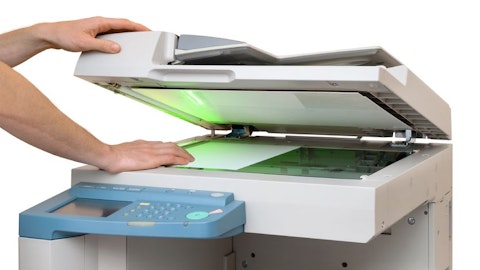AstroNova, Inc. (NASDAQ:ALOT) Q1 2024 Earnings Call Transcript June 8, 2023
Operator: Good day and welcome to the AstroNova’s First Fiscal Quarter 2024 Financial Results Conference Call. Today’s conference call is being recorded. I would now like to hand the conference over to Scott Solomon of the company’s Investor Relations firm, Sharon Merrill Associates. Please go ahead, sir.
Scott Solomon: Thank you, Ellen. Good morning, everyone, and thanks for joining us. Hosting this morning’s call are Greg Woods, AstroNova’s President and Chief Executive Officer; and David Smith, Vice President and Chief Financial Officer. Greg will discuss the company’s operating highlights. David will take you through the financials at a high level. Greg will make some concluding comments, and then management will be happy to take your questions. By now, you should have received a copy of the earnings release that was issued this morning. If you don’t have a copy, please go to the Investors page of the AstroNova website, www.astronovainc.com. Please note that statements made on today’s call that are not statements of historical fact are considered forward-looking statements within the meaning of the Private Securities Litigation Reform Act of 1995.
These forward-looking statements are based on a number of assumptions that could involve risks and uncertainties. Accordingly, actual results could differ materially, except as required by law. Any forward-looking statements speak only as of today, June 8, 2023. AstroNova undertakes no obligation to update these forward-looking statements. For further information regarding the forward-looking statements and the factors that may cause differences, please see the risk factors in AstroNova’s annual report on Form 10-K and other filings the company makes with the Securities and Exchange Commission. On today’s call, management will be referring to non-GAAP financial measures. AstroNova believes that the inclusion of these financial measures helps investors gain a meaningful understanding of the changes in the company’s core operating results.
It also helps investors who wish to make comparisons between AstroNova and other companies on both a GAAP and a non-GAAP basis. A reconciliation of the non-GAAP financial measures to their most directly comparable GAAP measures is available in today’s earnings release. And with that, I’ll turn the call over to Greg.
Gregory Woods: Thank you, Scott. Good morning, everyone, and thank you for joining us. Despite a macroeconomic climate that remains volatile, we delivered a solid first quarter performance. Our results highlighted our progress in 3 key areas: first, integrating the acquisition of Astro Machine; second, maintaining disciplined expense management; and third, capitalizing on the continuing rebound of the commercial aviation market. Through the exceptional work of our team members around the globe, we generated double-digit revenue growth in both our Product Identification and Test & Measurement segments. Our aggressive focus on implementing and maintaining cost-disciplined measures helped drive a 91% increase in operating income.
This increase translated to a 150 basis point improvement in operating margin. On the bottom line, net income grew to $800,000 or $0.11 per diluted share compared with $400,000 or $0.06 per diluted share in the same period of fiscal 2023. Now let’s look at each of the segments, beginning with Product Identification, which reported first quarter revenue of $25.1 million, nearly 16% higher than the year earlier period. The increase was driven by the addition of Astro Machine, which we acquired in August of last year. The integration of Astro Machine is proceeding on plan with a rapid level of cross-pollination in terms of engineering, manufacturing and product development between our operations in West Warwick and Elk Grove Village. For example, our first jointly developed printer has already been completed and will be released later this month, and at least one more additional jointly developed printer should be released before the end of the year.
First quarter segment operating profit margin improved 350 basis points to 10%, reflecting the higher Product ID revenue from a more favorable mix in the 2024 period. Going forward, we expect revenue mix to also benefit from the retrofitting of printers in the field that were sidelined since last year by a supplier-related ink quality issue as those units are restored and returned to full production. We expect this issue to be fully resolved before the end of the fiscal year. We kicked off our Product ID trade show season last month with great responses at 2 large European trade shows in Germany. interpack 2023 in Düsseldorf and a couple of weeks later, FESPA Global Print Expo in Munich. The shows featured a number of our latest products and accessories, and we were delighted by the number of high-quality leads we generated and the traction our new products are gaining with customers across an array of applications.
Also last month, we had another important milestone with the launch of our e-commerce site, giving customers the ability to research and purchase AstroNova printers and supplies directly over the Internet. It’s ideal for new customers searching for a solution as well as existing customers that want to reorder or check their account order status. The site provides a convenient, user-friendly experience. Initial customer response has been very positive, and we will continue to add products and functionality to the site throughout the year. Turning to the Test & Measurement segment. Revenue increased 11% year-over-year to $10.3 million driven by continuing improvement of the commercial aerospace market. Segment operating profit was up modestly, but margin was down 50 basis points to 20.1% of revenue.
With the projected global demand for air travel in the coming decades, the outlook for our aerospace printers, supplies and services is strong. Airbus anticipates 46,930 aircraft in service by 2041, up from 22,800 in 2020. A total of 39,490 of those are expected to be new deliveries with 60% to support growth and 40% to replace aircraft that will be retired from service. Boeing likewise projects a massive jump in airline fleets over the next 18 years. Turning to the data acquisition portion of Test & Measurement segment. In addition to our core aerospace and defense programs, we have landed several new power generation monitoring projects due to the exceptional accuracy and performance of our data acquisition products. We look forward to growing this new segment in the coming quarters.
Finally, we were pleased to see the company-wide bookings in the first quarter were up over 18%, $38.4 million. With further strengthening of our backlog, that totaled $38.7 million at quarter end. Backlog is up more than 32% year-over-year and more than 8% sequentially from the fiscal year-end. Now let me turn the call over to David for additional financial review.
David Smith: Thanks, Greg, and good morning, everybody. At the top line, we posted revenue 13% increased to $35.4 million and solid contributions from both segments. We always highlight the revenue — recurring revenue nature of our overall business model. And looking at revenue by type, hardware revenue grew by more than 25% to $11.7 million. Driven primarily by the addition of Astro Machine in the Product ID segment, segment revenue increased more than 6% to supplies revenue increased by more than 6% to $19.1 million, reflecting demand growth in both segments. The service and other category was up by more than 24% to $4.7 million. So in total, hardware revenue accounted for 33% of the total revenue in the first quarter; supplies, 54%; and service and other, the remaining 13%.
As a percentage of revenue, both hardware and service were up year-over-year, while supplies revenue was down about 4%. Greg noted the cost control in the quarter. Operating expenses as a percentage of revenue decreased to 30.8% in the first quarter from 32.1% in the same quarter last year, which along with a 40% — excuse me, 40 basis point increase in gross margins led to a 160 basis point increase in operating profit margin. I’ll notice — I’ll note that the operating expense this quarter was lower than the prior 2 quarters. That remains a very strict focus for us. From a geographic perspective, domestic revenue accounted for 64.5% of total revenue, up from 63.4% in the first quarter of the same quarter last year. International revenue accounted for 35.5% of total revenue compared with 36.6% a year earlier.
In dollars, we saw double-digit growth in Asia and Central and South America in the quarter and a high percentage — high single percentage growth in Europe. Adjusted EBITDA, which we define as normal EBITDA plus the share-based compensation, increased to $3.1 million or 8.6% of revenue compared to 6.2% of revenue last year. Cash was $1.5 million higher at the end of the year. Total debt at quarter end was $29.7 million, slightly lower than year-end. Total debt to trailing 12-month EBITDA is calculated in our bank agreement includes a full year of Astro Machine, and that checks in at 2.2x. On the historical GAAP financials, the debt to adjusted EBITDA would be 2.6x. We’re comfortable with this level. We do expect leverage, though, to decline through the year absent any acquisitions.
We’ve got sufficient capacity to support our business, the operating needs primarily. And we will use about $1.7 million of secured financing for some new capital equipment that will upgrade our hardware and supplies manufacturing equipment to improve efficiency and keep up with demand growth. Inventory investment increased in the quarter a little bit primarily to support our T&M segment. We’re still experiencing some supply chain struggles in the T&M electronic components area and in a few instance, in the PI segment as well, where we need to purchase extra buffer stocks. However, there are clear signs that those supply chain issues in aggregate are , and we’re confident that our inventory will shrink as we move through the year. We’ll use the free cash to reduce debt.
With that, I’ll turn the call back to Greg.
Gregory Woods: Thanks, David. In closing, we began fiscal 2024 with improved results that mark an important step towards our larger goal of driving sustained top line growth and margin enhancement. Barring any downturn in the global economy, fiscal 2024 should see continued momentum in the commercial aerospace business, which we expect to contribute favorably to the performance of our T&M segment. In Product ID, our focus is on innovation with multiple new products slated for launch this year and other technology initiatives underway across our lines of business. Now David and I will be happy to take your questions. Operator?
See also 25 Best Beaches in California and 10 Best Coal Mining Stocks to Buy.
Q&A Session
Follow Astronova Inc. (NASDAQ:ALOT)
Follow Astronova Inc. (NASDAQ:ALOT)
Receive real-time insider trading and news alerts
Operator: [Operator Instructions]. Our first question comes from Samir Patel.
Samir Patel: One question on the Product ID side. So I know this is the first Q1 that you have the Astro Machine business in there, and I noticed that there was a sequential step-down in revenue from kind of the Q3, Q4 levels. Is there some seasonality to that business?
Gregory Woods: There — we don’t have a good enough read exactly on that, but there does seem to be a favorability of the second half of the year from the numbers that we’ve looked at. And a few of the customers that we’ve talked to kind of bear that out. Although they don’t commit exactly to that kind of cycle, but it seems to be that type of a cycle. It tends to do kind of Q3, Q4 supplies build up is what we’ve seen.
Operator: [Operator Instructions]. Our next question comes from Peter Sidoti from Sidoti & Company.
Peter Sidoti: Gentleman, two quick questions. One, can you give me a capital spending budget for this year?
Gregory Woods: We can give you approximate. David, do you want to address that?
David Smith: Yes. We’ve got about $1.8 million sort of legitimately in the pipeline. So I’m going to estimate that we’ll end up at about $2 million.
Peter Sidoti: Okay. So the excess cash flow from operations will be used to pay down debt? Is that the assumption, unless an acquisition comes along?
David Smith: Yes, that’s correct.
Gregory Woods: That makes sense.
Peter Sidoti: And inventories, do you think they’ll stay flat given the growth? Or do you think you’ll be able to bring them down?
David Smith: We should be able to bring them down. I’m not going to commit to a number. As I said in my comments, I think the supply chain issues are abating. And we’re going to concentrate on getting the inventory levels down over the balance of the year. It’s a slow process, but we will get them down.
Gregory Woods: Right.
Peter Sidoti: Okay. And one simple question, Greg. What’s your economic assumptions for 2023 at this point?
Gregory Woods: My economic assumptions?
Peter Sidoti: Yes. What do you think is going to happen with the economy over the next 12 months? And how do you think it will affect you? There’s all different views of what’s going on…
Gregory Woods: Yes. I’ll have to admit, I’m not an economist. But right now, as I mentioned in my — big driver I mentioned in the presentation there is we do see a very strong demand in the aerospace. That’s probably the strongest indicator that seems to be solidly up. But as long as the economy works well and — it doesn’t seem to be affected at all so far. So we see that as a big driver.
Peter Sidoti: Okay. So you see no slowing down in any of your sectors at this point?
Gregory Woods: Well, I said in the aerospace, in our Product ID, it is a very global business and a lot of different market segments. So it’s hard to predict exactly what the macro economy may or may not affect that. Obviously, the better the economy, the better we will do.
Operator: [Operator Instructions]. Our next question comes from Tom Spiro from Spiro Capital.






